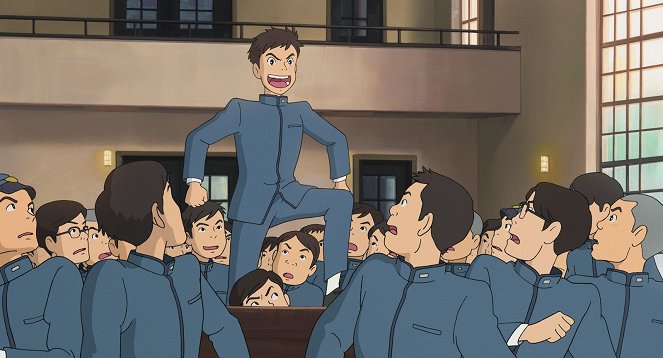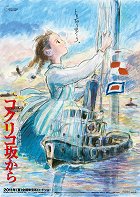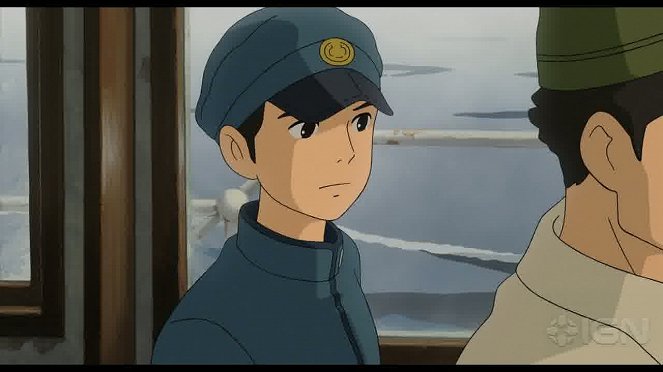Rendező:
Gorō MiyazakiOperatőr:
Atsushi OkuiZeneszerző:
武部聡志Szereplők:
岡田准一, 長澤まさみ, Jun Fubuki, Takashi Naitō, Teruyuki Kagawa, 大森南朋, Yuriko Ishida, Raymond Ochoa, 風間俊介, Rumi Hiragi, Keiko Takeshita, Haruka Shiraishi (több)Tartalmak(1)
The setting is Yokohama in 1963, and the filmmakers lovingly bring to life the bustling seaside town, with its misty harbor, sun-drenched gardens, shops and markets, and some of the most mouthwatering Japanese home-cooking set to film. The story centers on an innocent romance beginning to bud between Umi and Shun, two high school kids caught up in the changing times. Japan is picking itself up from the devastation of World War II and preparing to host the 1964 Olympics – and the mood is one of both optimism and conflict as the young generation struggles to throw off the shackles of a troubled past. While the children work together to save a dilapidated Meiji-era club house from demolition, their tentative relationship begins to blossom. But – in an unexpected twist that parallels what the country itself is facing – a buried secret from their past emerges to cast a shadow on the future and pull them apart. (GKIDS)
(több)Videók (2)
Recenziók (2)
Slow, non-confrontational and undramatic are adjectives that would normally be taken as negatives, but in the case of Goró Miyazaki’s second directorial effort, they are words of praise and descriptors of the signs of an exceptional work. In this hurried age, in the context of hyper-affected Japanese cinema and, in particular, in the context of the hysterical animated works created there, From Up on Poppy Hill is a unique gem. That is especially true when we consider that, in terms of genre, it is a romance and nostalgia film from the golden years of the 20th century and when we compare it with other such Japanese films of the past decade. Whereas the box-office smash Always – Sunset on Third Street and its sequels and imitators are characterised by an obsessive devotion to the details of the setting and minutely rendered recreations of the iconic buildings of the given period with the help of special effects and an almost propagandistic emphasis on traditional values personified by picturesque characters, Studio Ghibli’s project remains unobtrusive and takes the historical setting only as the rationalisation for the style of its narrative about youthful hopes. Viewers will only incidentally recognise that it involves a historical era from the elements in the second plane and the specific determination of the year in which it takes place comes only about halfway through the film in the form of posters for the upcoming Olympics. In the same manner, the romance in the film not only avoids the gender formulas that are otherwise glorified and hypertrophied in anime, but is completely devoid of any affectation and even artificial chastity. Conversely, the central couple’s relationship is wonderfully deep and dramatic, even without an overabundance of words. Like everything else in the film’s narrative, this relationship simply unfolds in subtle and very slowly developing demonstrations. If the director’s previous Tales from Earthsea was burdened by the immense excess of the plot and the vastness of the world and its mythology, then From Up on Poppy Hill is its exact antithesis – a story that would elsewhere serve for a single episode of a series is given all of the space it needs to calmly develop. The plot twists take the form of calmly stated and equably accepted messages and the dramatic development does not take the form of a steep sine curve, but rather resembles ripples on a calm sea. Using these methods, a retro film was created that absorbs the viewer with its captivating atmosphere of old carefree times without ever sliding into melancholy.
()
One of the most civil and story-driven of the most ordinary Studio Ghibli films is also one of the best. Goro Miyazaki puts an astonishing amount of detail into his father's script, and I completely understand why he lay low for nine long years after such meticulous labor. And as for traditional animation we expect from a studio with Totoro in their logo, this could very well have been his last contribution. If so, has he left behind a true treasure. Those subtle jokes, those painful memories of old age or, conversely, sincerely exposed emotions that only adolescence can bring – I got enough to last me through the next few films.
()
Galéria (34)
Photo © Universum Film GmbH



Hirdetés